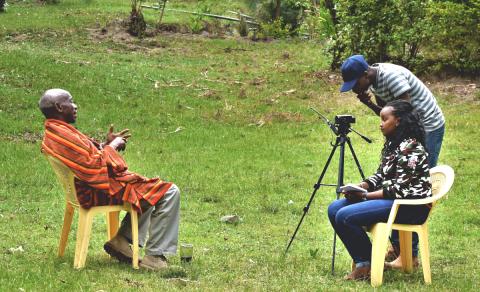2017 Kenya Workshop / Taller en Kenia de 2017

Maurice Oniango (Photo Credit / Crédito de la foto)
Indigenous languages, cultures and ways of life are under siege, not only in Africa but around the world. They are in danger of disappearing because they are not being transmitted to the next generation. The wisdom and practices of Indigenous Peoples are expressed through stories, rituals, songs, art and hands-on, ecological practices on the land. Sharing this knowledge is critical for the resilience of bio cultural systems.
With the disappearance of the Elders, oral heritage risks becoming lost, whereas it is fundamental that the younger generations have access to it in order for the UN Declaration on the Rights of Indigenous Peoples (UNDRIPs) to be applied in the countries and communities.
The main challenge therefore, is to safeguard and transmit an oral tradition that is disappearing to the younger generation in order to ensure that their rights are actually observed in their respective countries. The aim of the workshop was to have the youths get trained on operating Audio-Visual equipment for the purpose of collecting oral memory of the Elders during the workshop and after in their respective communities.
By gathering at the Workshop, the 11 youths and 6 Elders from various Indigenous communities from Africa were brought together during this 7-days workshop in Narok, Kenya in a way that instructs the youth and empowers them. The issue of sustainability - particularly relevant for a project on memory - is ensured Audio-Visual video training and follow-up on the part of the 11 indigenous youths, who have the skills and equipment to continue to produce videos for their communities, and to collect and disseminate the memory of their Elders.
For more information on the origin of the project, click on the "about" page and for more details on the people involved in the project, click on "Acknowledgments, support and partnerships".
//
Las lenguas, las culturas y los modos de vida autóctonos están en peligro, no solo en África sino en todo el mundo. Corren el peligro de desaparecer porque no se transmiten a la siguiente generación. La sabiduría y las prácticas de los pueblos indígenas se expresan a través de historias, rituales, canciones, arte y prácticas ecológicas en la tierra. Compartir estos conocimientos es fundamental para la resistencia de los sistemas bioculturales.
Con la desaparición de los ancianos, el patrimonio oral corre el riesgo de perderse, mientras que es fundamental que las generaciones más jóvenes tengan acceso a él para que la Declaración de las Naciones Unidas sobre los Derechos de los Pueblos Indígenas (DNUDPI) se aplique en los países y comunidades.
Así, el principal reto es salvaguardar y transmitir a las nuevas generaciones una tradición oral que está desapareciendo para que sus derechos sean realmente respetados en sus respectivos países. El objetivo del taller era formar a los jóvenes en el manejo de equipos audiovisuales con el fin de recoger la memoria oral de los ancianos durante el taller, y luego, en sus respectivas comunidades.
Los 11 jóvenes y 6 ancianos de varias comunidades indígenas de África se reunieron durante este taller de 7 días en Narok, Kenia, para que los jóvenes se instruyeran y se empoderaran. La cuestión de la sostenibilidad - particularmente relevante para un proyecto sobre la memoria - está garantizada por la formación en vídeo audiovisual y el seguimiento por parte de los 11 jóvenes indígenas, que tienen las habilidades y el equipo para seguir produciendo videos para sus comunidades, y para recoger y difundir la memoria de sus Ancianos.
Para más información sobre el origen del proyecto, haga clic en la página "Acerca de" y para más detalles sobre las personas involucradas en el proyecto, haga clic en "Agradecimientos, apoyo y asociaciones".





